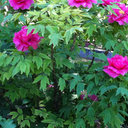Actinidia chinensis planch polysaccharide protects against hypoxia‑induced apoptosis of cardiomyocytes in vitro.
Λέξεις-κλειδιά
Αφηρημένη
Cardiac hypertrophy is frequently accompanied by ischemic heart disease. Actinidia chinensis planch polysaccharide (ACP) is the main active compound from Actinidia chinensis planch. In the present study, a cardiac hypertrophy model was produced by treating cells with Angiotensin II (Ang II), which was used to investigate whether ACP protected against cardiac hypertrophy in vitro. It was demonstrated that ACP alleviated Ang II‑induced cardiac hypertrophy. In addition, pretreatment with ACP prior to hypoxic culture reduced the disruption of the mitochondrial membrane potential as investigated by flow cytometry. Cell Counting kit‑8 analysis demonstrated that ACP maintained the cell viability of cardiomyocytes. The flow cytometric analysis revealed that ACP inhibited hypoxia‑induced apoptosis in cardiomyocytes treated with Ang II. Additionally, reverse transcription‑polymerase chain reaction and western blotting assays demonstrated that ACP decreased the expression of apoptosis‑associated genes including apoptosis‑inducing factor mitochondria associated 1, the cysteinyl aspartate specific proteinases caspases‑3/8/9, and cleaved caspases‑3/8/9. The results of the present study also demonstrated that ACP inhibited the activation of the extracellular signal‑regulated kinase 1/2 (ERK1/2) and phosphoinositide 3‑kinase/protein kinase B (PI3K/AKT) signaling pathways. Furthermore, the specific activation of ERK1/2 and PI3K/AKT reversed the apoptotic‑inhibitory effect of ACP. In conclusion, the protective effects of ACP against hypoxia‑induced apoptosis may depend on depressing the ERK1/2 and PI3K/AKT signaling pathways in cardiomyocytes treated with Ang II.



